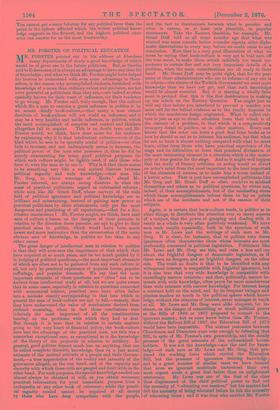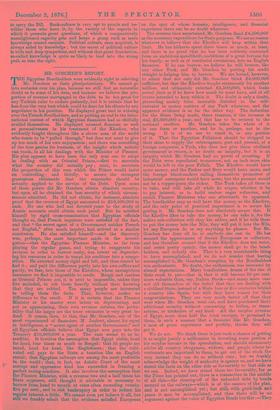MR. FORSTER ON POLITICAL EDUCATION.
W. FORSTER pointed out in his address at Aberdeen many departments of study a good knowledge of which
would be of great use to the future politician. But, as Goethe said to Eckermann, it is always an advantage to have any clear bit of knowledge; and what we think Mr. Forster might have helped his hearers to understand with even more advantage to them- selves, is the reason why accomplished students, furnished with knowledge of a more than ordinary extent and precision, are not more powerful as politicians than they are,—are indeed so often specially known for their want of influence, for their tendency to go wrong. Mr. Forster said, truly enough, that the culture which fits a man to exercise a great influence in politics is by no means chiefly book-culture,—that many a man almost destitute of book-culture will yet wield an influence, and it may be a very healthy and noble influence, in politics, which the most accomplished of essayists and readers and thinkers altogether fail to acquire. This is no doubt true, and Mr.
Forster would, we think, have done more for his audience by explaining why it is that intellectual culture—even of the kind which he sees to be specially useful in politics—so often fails to increase, and not unfrequently seems to decrease, the political power of the man who possesses it, than he did by merely enumerating the many good political purposes for which such culture might, be rightly used, if only those who have it, were the men so to use it. Why is it that there seems to be something very like a real mutual distrust between political sagacity and wide knowledge,—that men like Mr. Greg, to whose warnings of Rocks ' ahead Mr. Forster referred, are always seeing disasters in what the
mass of practical politicians regard as substantial reforms ;
while men like Mr. Grant Duff, whose surveys of the wide field of political ignorance and political knowledge are so brilliant and entertaining, instead of gaining new power as practical politicians by their attainments, only get the most dangerous and paralysing of all reputations,—that for a doc- trinaire omniscience Mr. Forster might, we think, have read men of culture a lesson on the dangers of their pursuits in relation to the direction these pursuits are apt to give to their practical aims in politics, which would have been much newer and more instructive than the enumeration of the many obvious uses of knowledge, in politics no less than in any other career.
The great danger of intellectual men in relation to politics is that they will over-rate the importance of that which they have acquired at so much pains, and be too much guided by it in judging of political questions,—the most important elements of which are often not to be gathered from any such culture at
el, but only by practical experience of popular forces, popular sufferings, and popular demands. We say that the most important elements of these questions are " often" not to be derived from intellectual study at all, but we are quite aware that in some cases, especially in relation to questions connected with economical science, practical men have often fallen into a mistake exactly corresponding to that into which in general the men of book-culture are apt to fall,—namely, that they have under-rated the value of conclusions derived from abstract reasoning, when in fact those conclusions were infinitely the most important of all the considerations bearing on the problems with which they had to deal. But though it is true that in relation to certain matters going to the very heart of financial policy, the book-culture men had the advantage of the practical men, yet this was a somewhat exceptional case, as exceptional as is the knowledge of the theory of the projectile in relation to artillery. In general, good politics depend much less on anything that can be called complete theoretic knowledge, than on a just moral estimate of the mutual attitude of a people and their Govern- ment,—a true appreciation of the reality and intensity of the grievances alleged, on the one hand, and of the capacity and sincerity with which these evils are gauged and dealt with on the
other hand. For such purposes, the special knowledge needed can almost always be obtained at will, as you obtain necessary
practical information for your immediate purpose from a cyclopa3dia or any other book of reference ; while the practi- cal sagacity needed cannot be acquired at all except by those who have deep sympathies with the people,
and the tact to discriminate between what is genuine and what is untrue, or at least only plausible, in popular statements. Take the Eastern Question, for example. Mr. Grant Duff told us all some months ago that what was wanted was more consuls, better consular reports, abler diplo- matic dissertations in every way, before we could come to any conclusion. Now that is a very good illustration of what we mean by saying that book-culture is very apt to lead men off
the true scent, to make them attach infinitely too much im- portance to certain fine and not very important details of a problem, when the main considerations are all ready to their hand. Mr. Grant Duff may be quite right, that for the pur- poses of those administrators who are to reform—if any one is to reform—the abuses of the Turkish Government we want more knowledge than we have yet got, and that such knowledge
would be almost essential. But it is starting a wholly false scent to pretend that this is the first desideratum in making up our minds on the Eastern Question. You might just as
well say that before you interfered to prevent a murder, you must call for the fullest evidence as to the family disputes in which the murderous design originated. What is called cul- ture is just as apt to direct attention from that which is of the essence of a problem, to that which is a comparatively
trumpery detail in politics, as in other matters. Every one knows that the actor can learn a good deal from books as to how he should so act as to interest his audience, but that what he can so learn is almost nothing compared with what he must learn, either from those who have practical experience of the stage and its difficulties, or from that practical divination of the most interesting element in a situation which is the mono- poly of true genius for the stage. And so it might well happen that the study of literary criticism on acting would so divert an actor's mind from the most important to the least important
of the_elements of success, as to make him a worse instead of a better actor. That is just how accomplished politicians like
Mr. Greg and Mr. Grant Duff so often contrive to mislead themselves and others as to political questions, by virtue not, indeed, of their accomplishments, but of the misleading stress which those accomplishments induce them to lay on points which are of the accidents and not of the essence of their subjects.
Again, it is certain that book-culture tends, in politics as in other things, to distribute the attention over so many aspects of a subject, that the power of grasping and dealing with it surely as a whole is very often positively weakened, We have seen such results repeatedly, both in the speeches of such
men as Mr. Lowe and the writings of such men as Mr.
Greg. It is clear, for instance, that in politics very dense ignorance often characterises those whose interests are most profoundly concerned in political legislation. Politicians like
Mr. Lowe and Mr. Greg see this, and raise a hue and cry about the frightful dangers of democratic legislation, as if there were no dangers, and no frightful dangers, on the other side. The truth no doubt is that to be identified with any widespread interest is compatible with frightful ignorance, but it is also true that very wide knowledge is compatible with exceedingly narrow interests ; and that, politically, narrow in- terests with wide knowledge, often prove far more mischievous than wide interests with narrow knowledge. For interest keeps a constant hold on the mind, and by its frequent twinges and pinches teaches us much in the political sphere which know- ledge, without the stimulus of interest, never manages to teach at all. Mr. Lowe and Mr. Greg were alike eloquent, for in- stance, on the danger of committing so much political power as the Bills of 1866 or 1867 proposed to commit to the ignorant masses ; but as none know better than Mr. Forster, without the Reform Bill of 1867, the Education Bill of 1870 would have been impossible. The mutual jealousies between Churchmen and Dissenters went near enough to defeating that Bill, in spite of Mr. Forster's own generalship, and the steady pressure of the great interests of the enfranchised house- holders. It was not the knowledge—nor the zeal for know- ledge—of such men as Mr. Lowe and Mr. Greg, that pro- duced the working force which carried the Education Bill, but the pressure of ignorance desiring knowledge ;
and in a great number of similar cases we have learned that even an ignorant multitude understood their own most urgent needs a great deal better than an enlightened aristocracy. Mr. Lowe was one of the first of the class thus dispossessed of the chief political power to find out the necessity of "educating our masters," but his masters had felt the necessity of being educated before he felt the necessity of educating them ; and it was they who enabled Mr. Forster to carry the Bill. Book-culture is very apt to puzzle and be- wilder those who have it, by the variety of the aspects in which it presents great questions, of which a comparatively unenlightened sagacity gets and keeps a grasp such as mere knowledge cannot emulate. Political culture, once acquired, is always aided by knowledge ; but the secret of political culture is wide and deep sympathies, and without that great foundation, so-called knowledge is quite as likely to lead into the wrong path as into the right.



































 Previous page
Previous page